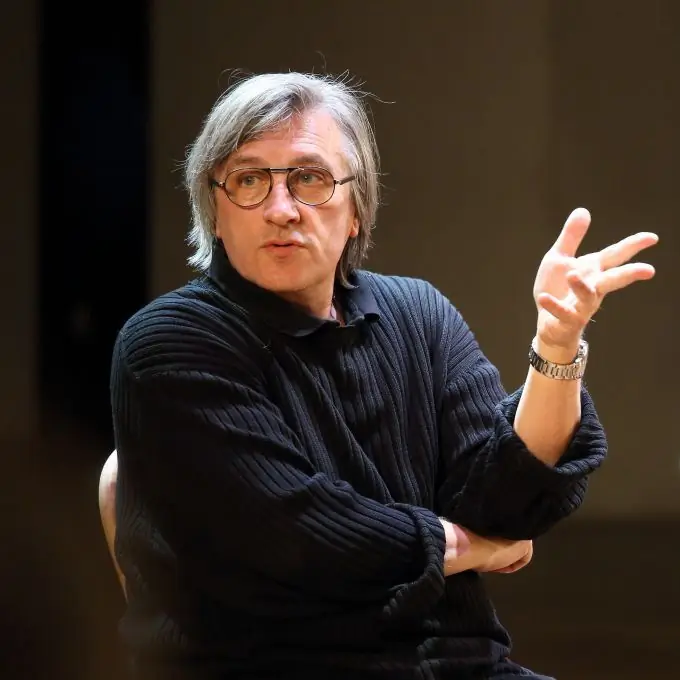- Author Antonio Harrison [email protected].
- Public 2023-12-16 07:44.
- Last modified 2025-01-22 21:44.
The production director Dmitry Anatolyevich Krymov, popular throughout the post-Soviet space, is also a very interesting conversationalist. He always has his own opinion on a variety of issues. And, of course, he is ready to talk endlessly about modern theatrical activity. After all, modern tendencies of confrontation between the traditional classical school of theatrical art and innovative ideas for the formation of the basic concepts of productions are quite relevant today. According to Dmitry Anatolyevich, it is the consumer's interest that is the main criterion for the theatrical life of the country.

One of the pillars of modern national culture today is, of course, stage director Dmitry Krymov, whose genius is now recognized by the entire theatrical community. He is a member of the Union of Theater Workers of Russia and the Union of Artists and has many thematic awards, including awards from international festivals.
Biography of Dmitry Krymov
October 10, 1954 in a creative metropolitan family (father - the famous director Anatoly Efros, and mother - theater critic and art critic Natalya Krymova) the future theater director was born. Due to the wave of anti-Semitism in our country during the birth and maturation of Dmitry, it was decided at the family council that the boy would take the mother's surname. And, as life itself has shown, this decision was justified.
After graduating from a general educational institution, Krymov entered the Moscow Art Theater School (staging department), following in the footsteps of the famous parent. In 1976, with a higher education diploma, he went to develop his professional career at the Theater on Malaya Bronnaya. And his first directorial projects were the performances "Remembrance", "Summer and Smoke", "Living Corpse", "A Month in the Country" and others.
In the period from 1985 to the beginning of the "nineties", when his father passed away, Dmitry mainly collaborated with the Taganka Theater. Here theater-goers could enjoy his talent as a director in the performances: “War has no woman's face”, “One and a half square meters” and “The Misanthrope”. However, in addition to his native theatrical stage, the famous scriptwriter took part in productions of theaters located in many cities of Russia (St. Petersburg, Nizhny Novgorod, Volgograd and others), as well as in Japan and Bulgaria. And his colleagues in the creative department were such celebrities as Portnova, Tovstonogova, Arie and Shapiro.
After the death of his father, Dmitry Krymov decided to abandon the work of a set designer and completely focused on the visual arts. It was painting and graphics that made him famous in France, England and Germany, where he exhibited at thematic exhibitions. And in Moscow, his artistic work was widely presented in the Russian Museum.
And at present, the "Tretyakov Gallery" and "Pushkin" Museum contain among their exhibits and canvases by Dmitry Krymov. From 2002 to this day, he began teaching at the Russian Academy of Theater Arts. He also supervises the Laboratory of the School of Dramatic Art and the course of theater artists.
It is interesting that the director considers the postulate of “the viewer's misunderstanding of the director’s intention” to be the main author's idea of any theatrical project. This will allow theater-goers to reflect and draw conclusions only after long conclusions. That is, the success of modern theater lies precisely in the philosophical and psychological plane, which excludes banal plots.
The director's personal life
In the family life of the famous director, everything is quite stable and calm. The only marriage with his wife Inna was the reason for the birth of a son. His wife is a professional in the field of economics and psychology and in recent years has been very seriously helping her husband in his staging activities. Interestingly, in 2009, the Jewish communities of Russia, Dmitry Krymov was recognized as "Person of the Year", and he has not celebrated his birthday for a long time, preferring to visit the graves of his revered parents at this time, who were able to give him a worthy creative upbringing.






